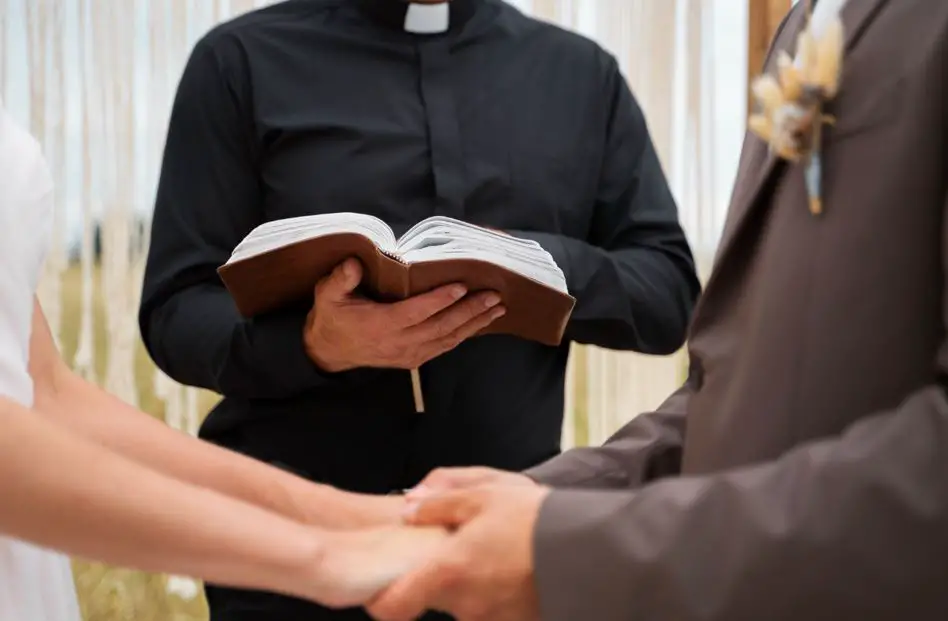In Australia, officiating a wedding or religious ceremony is a significant responsibility requiring official credentials. Both licensed and ordained ministers can fulfil this role, but there are notable distinctions between the two.
While “licensed” and “ordained” are often used interchangeably within various faiths, they carry different meanings in practice. This guide will delve into what it means to be a licensed or ordained minister, each role's responsibilities, and how these distinctions impact their duties.
Let’s get straight to the point
In Australia, officiating religious ceremonies requires ordination or licensing, with distinct responsibilities tied to each.
Ordained ministers have permanent status, are recognised broadly across congregations, and can perform various religious duties, such as baptisms and weddings.
They typically undergo extensive training, sometimes involving formal theological education.
On the other hand, licensed ministers usually hold temporary credentials limited to specific duties like weddings or teaching, often within a single church. Licensing may need periodic renewal and varies by state laws.
The differentiation ensures that ministers are appropriately prepared, with ordination denoting a lifelong commitment to pastoral responsibilities and licensing allowing for flexible, short-term roles within the ministry.
Comparing Ordination and Licensing in Ministry Roles

Both ordained and licensed ministers play important roles, but there are clear differences in their responsibilities and authority.
Key Differences Between Ordained And Licensed Ministers
- Permanency:
- Ordained Ministers: Permanent clergy with an enduring commitment to ministry.
- Licensed Ministers: Often have a temporary license that may need periodic renewal.
- Scope of Responsibilities:
- Ordained Ministers: Can perform baptisms, marriages, funerals, and other sacred rites.
- Licensed Ministers: This may be limited to officiating weddings or teaching but may not conduct all religious ceremonies.
- Recognition Across Congregations:
- Ordained Ministers: Generally recognised across congregations, even outside their original church.
- Licensed Ministers: Typically limited to serving within the issuing church.
What Is Ordination?
Ordination is a formal recognition by the church that an individual is qualified and called to serve in a ministry capacity. Ordained ministers often undergo extensive training, sometimes through years of formal theological education or pastoral experience. Ordination confers a higher standing in the clergy, granting the individual authority to perform various religious services, such as leading worship, delivering sermons, and baptising congregants.
Pathways To Ordination
There are various paths to ordination, including:
- Formal Education: Many ordained ministers hold degrees in theology or divinity.
- Online or Short Programs: Some denominations permit ordination through brief online courses, although this is less common.
- Church Recommendation: Local churches may recommend members for ordination based on significant service and commitment.
Ordination is a lifelong commitment, generally recognised across multiple congregations, making it transferable and valid beyond a single church or local congregation.
Recognising Ordination in Transformation Ministries
Ordination must be formally recognised for ministers within Covenanting Transformation Ministries. This recognition signifies a minister’s accountability to God and the church. It also validates their ordination as legally binding across other churches within the same covenant, ensuring a smooth transition if they serve in different locations or congregations.
Importance Of Ordination Recognition
- Official Authority: Recognition of ordination grants ministers authority to conduct religious ceremonies that hold both spiritual and legal significance.
- Wider Acceptance: This recognition allows ministers to serve in different churches within the same covenant.
- Validation Across Congregations: Validates the minister’s ordination beyond their initial church.
What Is Licensing?
A license, unlike ordination, is typically a temporary credential granted by a local church or religious organisation. Licensed ministers are authorised to perform specific religious duties, including officiating weddings in some states where they are legally recognised as ministers.
Licensing Process And Requirements
Licensing often involves applying through a church board or a local governing religious body. This process validates an individual's skills in ministry, allowing them to serve in various roles that might include preaching, teaching, or other non-pastoral responsibilities. However, licensing may come with limitations:
- Duration: Licenses are often granted for a limited period and may need renewal.
- Restricted Duties: Depending on local regulations and church policies, licensed ministers may only perform certain ceremonies or services.
- Local Authority: Licensing authority may be confined to the congregation or church issuing the license.
For example, in states where religious ceremonies require a licensed minister, licensed ministers may officiate weddings or funerals, but only within the boundaries set by the issuing church.
State Variations in Australia for Ministers’ Roles

The requirements for licensing and ordination vary across different Australian states. For example:
- New South Wales: Ordained ministers may officiate any religious ceremony, but licensed ministers must apply for authority to officiate specific ceremonies, such as weddings.
- Victoria: Recognizes ordination across all churches; however, licensing must be verified through local state laws for legal ceremonies.
Understanding these variations is crucial for ministers who wish to perform legally recognised ceremonies outside their initial congregation or state.
Ordained vs. Licensed: Implications for Marriage Officiating
Marriage officiating is a duty that varies significantly based on whether a minister is licensed or ordained. Some states in Australia require a minister to be licensed specifically for performing weddings, while others accept ordination as a valid qualification.
Requirements For Marriage Officiating
- Ordained Ministers: Typically recognised by the state to perform weddings without additional licensing.
- Licensed Ministers: Must meet state-specific requirements, which may include applying for a marriage license to officiate legally recognised weddings.
Licensed ministers interested in officiating weddings should consult local guidelines to ensure they meet legal requirements.
Education Levels and Ordination
Educational requirements for ordained ministers vary by denomination. Some Christian traditions expect ministers to have completed a Master of Divinity or equivalent theological degree, particularly for ordination.
Examples Of Education Paths For Ordained Ministers
- Master of Divinity: Common in denominations like the Unitarian Universalist Association and the Evangelical Covenant Church.
- Bachelor’s Degree: In some traditions, a bachelor’s degree is sufficient for licensing but not necessarily ordination.
- Seminary Programs: Many churches sponsor their ordained ministers’ education through specific seminary programs to foster higher theological training.
Distinct Permissions for Ordained and Licensed Ministers
Not all religious duties are available to licensed ministers. Ordination often brings the full scope of pastoral duties, whereas licensed ministers may only fulfil certain roles.
Permissions By Ministerial Status
- Ordained Ministers: Typically have the authority to perform baptisms, funerals, and various sacraments.
- Licensed Ministers: Often restricted to roles such as preaching or specific ministry tasks and may require additional licensing for weddings and funerals.
Reasons for Differentiating Between Licensed and Ordained Ministers
The distinction between licensed and ordained ministers helps ensure that church leaders are prepared and qualified for their responsibilities. This differentiation benefits both the church and the congregation.
Primary Reasons For Differentiation
- Educational Requirements: Ordination often demands advanced theological training.
- Accountability: Licensing provides a way for the church to validate and monitor the work of lay ministers.
- Temporary Roles: Licensing allows congregations to assign short-term ministry roles without conferring permanent clergy status.
For denominations experiencing a clergy shortage, licensing allows laypersons to serve in ministry roles temporarily.
Conclusion
The roles of licensed and ordained ministers, while often overlapping, are distinct in their responsibilities and recognition across churches.
Ordained ministers hold a permanent position within the church and can perform all pastoral functions, while licensed ministers may serve in more specific, sometimes temporary roles, often with limitations.
Both roles are integral to ministry work, providing a pathway for qualified individuals to support their congregations and fulfil essential spiritual duties within their communities.
For any minister, understanding these distinctions and state-specific requirements is essential for serving faithfully and effectively.
FAQs About Minister
Ordination permits the minister to perform church rites and sacraments, such as baptisms, legal marriages and funerals. ... Unlike ordination, which is usually considered to be a one-time event, the credentials for licensed ministers may only be valid for a specific period of time.
It is important to get a license to preach the gospel when you sense the call of God to minister to people spiritually. As a licensed minister you have the right to preach, teach, and officiate weddings.
The main difference between the two is that the wedding officiant owns a degree that allows him to officiate a wedding. On the other hand, an ordained minister gets ordained from any particular church and is allowed to do other church activities as well along with officiating a wedding.
In Christianity, a minister is a person authorised by a church or other religious organization to perform functions such as teaching of beliefs; leading services such as weddings, baptisms or funerals; or otherwise providing spiritual guidance to the community.

